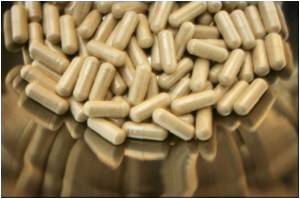Exemestane, a synthetic steroid drug widely prescribed to fight breast cancers that thrive on estrogens.

A summary of the research, performed on a variety of different animal and human cells, was published online in the Proceedings of the National Academy of Sciences on Nov. 4, and suggests that exemestane's effectiveness against breast cancer could be due to more than its ability to halt estrogen production, the scientists say. The study's results further imply that the drug, a so-called aromatase (estrogen synthesis) inhibitor, could potentially be prescribed more widely, including to men, as a way to counteract the wear and tear on cells that often leads to chronic diseases.
"Cells already have their own elaborate protective mechanisms, and in many cases they are 'idling.' The right drugs and foods can turn them on to full capacity," says Paul Talalay, M.D., the John Jacob Abel Distinguished Service Professor of Pharmacology and Molecular Sciences at the Johns Hopkins University School of Medicine. "In our cell studies, we found that exemestane does exactly that," he adds.
Talalay explains that cells are constantly under assault from a wide range of potentially lethal agents. UV radiation from the sun can cause errors in DNA sequences; reactive oxygen species — a class of unstable, oxygen-containing chemicals that are a natural byproduct of cellular functioning — can build up and cause damage to DNA and proteins; and ongoing inflammation can damage many essential cell functions.
To withstand the pressures against them, cells have evolved various mechanisms for protecting themselves. One involves turning on genes that produce a "SWAT team" of proteins, he notes, collectively called the phase 2 response. In normal cells, this response is not fully active. In previous work, the Talalay group found that sulforaphane, a chemical found in broccoli and other vegetables, can ramp up the phase 2 response and help protect cells from the constant wear and tear that they experience.
"Looking at the chemical structure of exemestane, I realized that it was similar to sulforaphane, and I wondered if it too could boost cells' phase 2 protective responses," says Talalay.
Advertisement
Exemestane was also effective in reducing the amount of reactive oxygen species in human retinal cells, where they are thought to contribute to age-related macular degeneration. It was also able to protect rat heart cells from similar damage.
Advertisement
Assessing exemestane's ability to protect cells from inflammation produced a surprise, Talalay notes. In all the other tests, Liu and Talalay had tried not only exemestane but also a mixture of exemestane and sulforaphane. They generally found that the two had an additive effect, suggesting that they both worked in a similar way and were more or less interchangeable. However, when mouse immune cells were exposed to both exemestane and sulforaphane, the two together were much more potent and at lower doses than either chemical alone.
"Our research showed unexpectedly that exemestane has multiple actions, which suggests that a wider use of exemestane should be considered if clinical tests confirm our cellular studies," says Talalay. "Of course, even if clinical tests confirm what we saw in cells, exemestane may not be appropriate for everyone. It's already advocated as a preventive measure for high-risk breast cancer populations, but it may also be valuable in preventing other noncancerous chronic diseases."
Talalay notes that the drug is already approved by the U.S. Food and Drug Administration and taken by tens of thousands of women, with minimal side effects.
Source-Eurekalert















